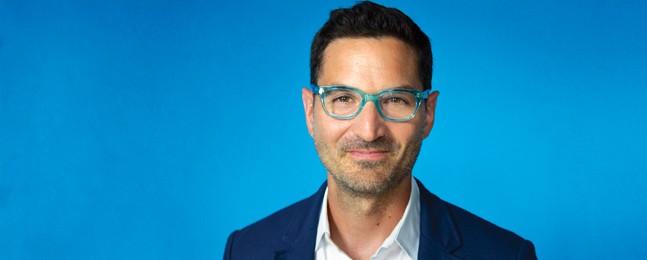The Brandeis Questionnaire
Guy Raz ’96

Kara Frame / NPR
Guy Raz
If you listen to National Public Radio regularly, you’ve heard his voice. It’s youthful and savvy but not know-it-all-ish. It crackles with curiosity.
Whether Guy Raz ’96 is talking with Spanx billionaire Sara Blakely about shapewear, querying neuroscientist/novelist Lisa Genova (“Still Alice”) about Alzheimer’s or hamming it up for the primary-school set on his newest podcast, “Wow in the World,” he’s got a voice made for radio.
And a mind made for storytelling. Raz might be NPR’s most inventive inventor these days, dreaming up new programs that keep you tuned in, even in the driveway, even when the kids are having a meltdown.
Raz gave up hosting weekend episodes of “All Things Considered” in 2012 to create and host his own in-depth narrative programs. This year, he became the first person in podcasting history to have three shows simultaneously in the iTunes podcast chart’s Top 20.
Two of them are NPR’s most-popular programs: the “TED Radio Hour” and the “How I Built This” podcast. The first features Raz’s probing interviews with TED Talk experts. Launched in 2013, it’s the fastest-growing program in public-radio history, according to the NPR website — currently downloaded more than 120 million times each year. The second mines the missteps and the leaps of faith successful entrepreneurs make on their way to rock-star status. Each month, more than 14 million people around the world tune into both programs.
Raz’s latest podcast is aimed at his favorite demographic: kids. NPR bills “Wow in the World” as its first program for 5-to-12-year-olds “and their curious grown-ups.” Surrounded by silly sound effects, co-hosts Raz and Mindy Thomas explore topics like brain freeze; the link between stinky socks and mosquito bites; and the effect flatulent, belching cows have on global warming.
Two decades after he started listening to NPR as a Brandeis student, Raz is pulling out all the stops to usher in radio’s new golden age.
What was your idea of perfect happiness when you were at Brandeis?
The library — all the way down in the basement, in a comfy chair — on a snowy evening.
Who was your favorite Brandeis professor?
Eugene Black, Antony Polonsky, Karen Klein, Bob Manners and David Hackett Fischer.
Where did you usually spend Saturday night?
In the basement of the library, in a comfy chair, reading.
If you could be any other Brandeisian, who would it be?
Abraham Maslow. I want to know how to achieve self-actualization.
What is the most important value you learned at Brandeis?
The importance of justice.
What was the most important shortcut you learned in college?
Always visit professors during office hours. If you show an interest in what they’re teaching, they’ll show an interest in you.
Which talent did Brandeis help you develop most?
The ability to be slightly less awkward in public.
What do you wish you had studied harder?
Everything: Philosophy, literature, ancient texts, languages. As I’ve discovered, youth is given to us when we least appreciate it.
What three words of advice would you give to current Brandeis students?
Try absolutely everything.
If you could go back to college, what would you do differently?
I’d dance and be silly and not so serious.
What would your friends say is your greatest strength?
Self-doubt.
What would your friends say is your greatest weakness?
Self-doubt.
What is your blind spot?
My children.
What book do you read again and again?
“Homage to Catalonia” [by George Orwell, about the Spanish Civil War], the greatest work of reportage and moral courage I have ever encountered.
What movie changed your life?
“Wings of Desire” and “Boyhood.”
Which possession do you most like to look at?
Not a “possession,” but the faces of my children. They bring me joy even on hard days.
Whom would you like to sing a duet with?
My wife (who substitutes for June Carter Cash when we do karaoke).
Which deadly sin is your middle name?
Pride. (It’s a corrosive sin. I try to meditate it away.)
Which bad break was your biggest blessing?
Getting rejected for so many jobs at NPR and elsewhere I thought were important and prestigious. Each rejection was a hidden blessing I would come to appreciate only later in life.
If you could climb into a time machine, whom would you like to hang out with?
John Brown. A complex figure, for sure, but a man who understood something so many Americans at the time did not: Slavery was a cancer, and it had to be ended immediately.
